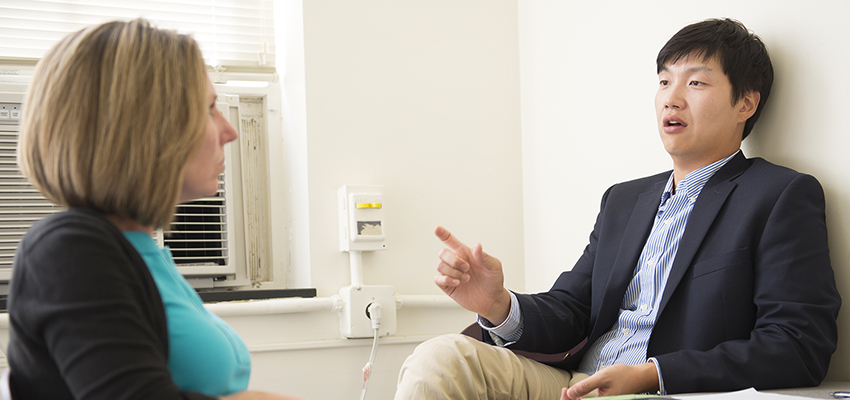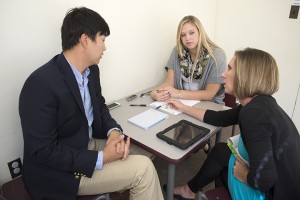Seung-Il Lee, M.S. ’11, just wants to get a job in the same ZIP code where he lives.
Lee studied accounting at Illinois State, and his wife has a job in Bloomington-Normal, but he still works remotely for a company in his native South Korea. His stumbling block to getting a job here? He speaks English with a thick accent. He says people regularly ask him to repeat himself and even his 4-year-old son has begun correcting his pronunciation.
The “rl” sound, like in “girl,” is particularly troublesome for him.
“That makes me hurt to pronounce,” Lee said jokingly.
“I recognize that I have some problems in my pronunciations,” he said, “but it is hard to break my old habits without any other help.”
So on the recommendation of a friend, he enrolled this semester in the accent modification program at the Eckelmann-Taylor Speech and Hearing Clinic. Clinic Supervisor Rene McClure ’91, M.S. ’92, runs the program with the assistance of graduate speech language pathology students Laura Aughenbaugh and Sara Mandernach ’12.
“This is not an English class,” McClure said. “(The clients) already have the skills necessary to speak English well. And now we’re looking at modifying, changing how (they) speak it.”
Lee is one of five clients currently in the program. He meets with Mandernach once a week for an hour, and then spends time at home listening to a CD-ROM of a native English speaker, repeating what is said, recording that, and then listening back to how he sounds in comparison.
“He has to be good listener,” McClure said. “He has to be able to detect, ‘Do those two sound the same? Or is mine off a little bit.’ A part of the program is becoming a better listener as to what is right and what is wrong.”
Mandernach works with Lee to discriminate between sounds. “I notice that’s a big one. He won’t even realize he is saying the wrong sound, because in his native language he never learned that sound,” she said.
McClure uses a systematic approach to reduce clients’ accents: the Compton Pronouncing English as a Second Language program. The 13-week program begins with an assessment of which sounds the teachers must target for improvement and then uses a step-by-step process to help clients.
“Through their course work, (the graduate students) acquire the knowledge of what is normal production and how we normally produce these sounds, and then they practice listening,” McClure said. “So now they can listen to their client and detect, ‘That sounded different. This is why it sounded different. I want you to do it this way, not that way.’”
Helping students and professors
McClure has been running the accent modification program since 2008. The clinic is the only certified provider of this
service in Bloomington-Normal, she said.
Many of the clients have been Illinois State students and professors. Center for Renewable Energy Associate Director and Assistant Professor Jin Jo, who is also from South Korea, has been in the program for four semesters. He started taking the classes after some of his students started noting in their feedback that they had trouble understanding what he said.
“I didn’t take them seriously in the beginning,” Jo said. “But I thought, ‘Well if there is a way I could reduce my accent, then it would be better (when I) communicate with my students.’ That shouldn’t be the factor limiting the communication.”
Intonation was one of Jo’s bigger problems. McClure said clients sometimes pronounce each syllable in a word correctly but stress the wrong syllable.
“That’s how we perceive accent,” she said. “Are the sounds produced the way that we would produce them? Is the syllable stress accurate? And the intonation pattern—does their melody sound the same? And it’s all of those things combined that create the perception of an accent.”
Like many foreign speakers of English, Jo had problems with the “th” sound. McClure said clients from as disparate parts of the world as Egypt, India, and China aren’t used to pronouncing sounds like “th,” which require they stick out their tongue.
“That is awkward and weird (for them),” she said.
Jo said his ear for proper pronunciation has improved enough that he now notices when fellow Koreans mispronounce English words. What’s his advice for them? He recommends the program.
Jo’s students have also noticed the difference in his speech.
“I’m getting less and less comments about my accent,” he said.
Kevin Bersett can be reached at kdberse@IllinoisState.edu.


